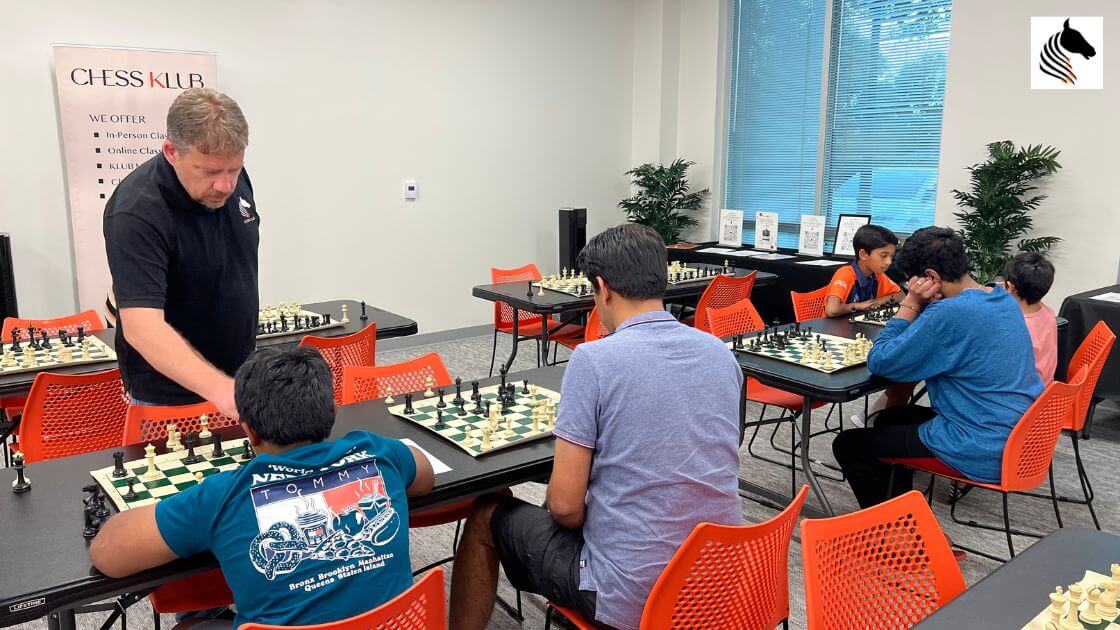03 Sep Do I Need a Chess Coach? Answering the Big Question

Getting a Chess Coach today is a big decision. The availability of multiple resources all across the internet make the concept of getting a coach seem unnecessary. Everyone starts this Black & White journey with set goals in their mind.
Your requirements may be unique and here are a few factors you must consider before deciding to get a coach.
Personalized Guidance
A chess coach can provide personalized feedback and guidance tailored to your strengths and weaknesses. They can identify areas where you need improvement and design a training plan to address those specific aspects of your game.
Analysis and Feedback
A coach can analyze your Chess games, identify mistakes, and offer insights into your thought process. This analysis can be invaluable in helping you understand your strengths and weaknesses and develop a deeper understanding of the game.
Skill Level
If you’re a beginner or an intermediate player, a chess coach can help you understand the fundamentals, develop a strong foundation, and learn essential chess strategies. Advanced players can also benefit from a coach who can help them refine their tactics and analyze complex positions.
Structured Learning
Coaches can help you follow a structured learning path, which can be more effective than learning on your own. They can recommend appropriate study materials, tactics exercises, and opening repertoires.
Preparing for Tournaments
If you plan to participate in chess tournaments, a coach can help you prepare by working on your opening repertoire, strategy, and helping you develop a game plan against specific opponents.
Improving Specific Areas
If there are specific aspects of your game that you want to improve, such as tactics, endgames, or positional understanding, a coach can tailor their instruction to focus on these areas.
Accountability and Motivation
Having a coach can help you stay motivated and disciplined in your practice. Knowing that someone is monitoring your progress and offering guidance can push you to consistently work on your chess skills.
Time and Commitment
Consider how much time you’re willing to commit to chess. If you’re serious about improving rapidly, a coach can help you make the most of your practice time.
Cost
Hiring a coach comes with a financial cost. You’ll need to evaluate whether the potential benefits in terms of skill improvement and enjoyment of the game outweigh the monetary investment.
Availability
With the rise of online coaching, you have access to coaches from around the world. This can be advantageous in finding a coach who aligns with your goals and schedule.
A chess coach can be highly beneficial if you’re committed to improving your chess skills and are willing to invest time and effort. They can provide personalised guidance, structured learning, motivation, and feedback. Coaches come at various price points and skill levels, so you can find one that suits your needs and budget. Ultimately, the right time to get a chess coach is when you believe that their guidance will significantly enhance your chess journey and help you achieve your objectives.
Furthermore, deciding when to get a chess coach depends on your individual goals and circumstances. Here are some situations in which it may be a good idea to consider hiring a chess coach:
Starting as a Beginner
If you’re new to chess and want to learn the basics and build a strong foundation from the outset, it can be beneficial to work with a coach. They can teach you the rules, fundamental principles, and help you avoid common mistakes.
Plateauing in Skill
If you’ve reached a plateau in your chess improvement and find it challenging to progress further on your own, a coach can provide fresh insights, identify areas where you need improvement, and help you break through your limitations.
Maintaining Consistency
If you struggle to maintain consistent study and practice habits on your own, a coach can provide accountability and motivation to keep you on track.
Remember that getting a coach is a personal decision, and it should align with your chess-related goals and your commitment to the game.
While a coach can provide guidance and strategies, your progress ultimately depends on your dedication and effort. Coaches might not always emphasize that improvement requires consistent practice and self-motivation. They may also not always inform you that improvement in chess takes time, and it’s a journey that extends beyond immediate wins or losses. Coaches might not always highlight the need for patience and the importance of long-term development. Finally, coaches may not explicitly mention that losses are valuable learning experiences. Embracing losses and analyzing them can provide insights into areas that need improvement.
Remember that coaches have different teaching styles, and what they choose to emphasize can vary. It’s always a good idea to have open communication with your coach about your goals, concerns, and any areas you feel need more attention. Additionally, supplementing your coaching with independent study, exposure to different chess resources, and a well-rounded approach to improvement can enhance your chess journey.



